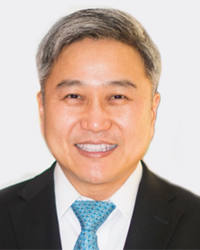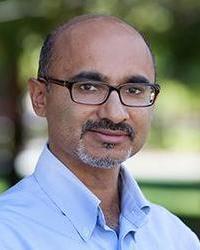Webinar Series
Determinants of Repo Haircut: Counter-party Risk and Collateral Risk
2021
Session Chair: Zhiguo HE
Fuji Bank and Heller Professor of Finance and Jeuck Faculty Fellow, Booth School of Business, University of Chicago and Senior Fellow, ABFER
Hanming FANG, Joseph M. Cohen Term Professor of Economics, University of Pennsylvania and Senior Fellow, ABFER
Co-authors:
Yongqin WANG Associate Professor of Economics, School of Economics, Fudan University
Xian WU PhD Student, Department of Economics, University of Wisconsin-Madison
Arvind Krishnamurthy, The John S. Osterweis Professor of Finance, Stanford Graduate School of Business, Stanford University and Senior Fellow, ABFER
Speakers
-

Hanming FANG
Joseph M. Cohen Term Professor of Economics, University of Pennsylvania and Senior Fellow, ABFER
Hanming Fang is an applied microeconomist with broad theoretical and empirical interests focusing on public economics. His research integrates rigorous modeling with careful data analysis and has focused on the economic analysis of discrimination; insurance markets, particularly life insurance and health insurance; and health care, including Medicare. In his research on discrimination, Professor Fang has designed and implemented tests to examine the role of prejudice in racial disparities in matters involving search rates during highway stops, treatments received in emergency departments, and racial differences in parole releases. In 2008, Professor Fang was awarded the 17th Kenneth Arrow Prize by the International Health Economics Association (iHEA) for his research on the sources of advantageous selection in the Medigap insurance market.
Professor Fang is currently working on issues related to insurance markets, particularly the interaction between the health insurance reform and the labor market. He has served as co-editor for the Journal of Public Economics and International Economic Review, and associate editor in numerous journals, including the American Economic Review.
Professor Fang received his Ph.D. in Economics from the University of Pennsylvania in 2000. Before joining the Penn faculty, he held positions at Yale University and Duke University. He is a research associate at the National Bureau of Economic Research, where he served as the acting director of the Chinese economy working group from 2014 to 2016. He is also a research associate of the Population Studies Center and Population Aging Research Center, and a senior fellow at the Leonard Davis Institute of Health Economics at the University of Pennsylvania. -

Arvind KRISHNAMURTHY
The John S. Osterweis Professor of Finance,Stanford Graduate School of Business, Stanford University and Senior Fellow, ABFER
Arvind Krishnamurthy is the John S. Osterweis Professor of Finance at the Stanford Graduate School of Business and a Research Associate at the National Bureau of Economic Research (NBER). He formerly taught at the Kellogg School of Management (1998-2014).
Professor Krishnamurthy studies finance, macroeconomics and monetary policy. He has studied the causes and consequences of liquidity crises in emerging markets and developed economies, and the role of government policy in stabilizing crises. Recently he has been examining the importance of U.S. Treasury bonds and the dollar in the international monetary system. He has published numerous journal articles and received awards for his research, including the Smith Breeden Prize for best paper published in the Journal of Finance, the Western Finance Association Corporate Finance Award, and the Swiss Finance Institute’s Outstanding Paper Award. He has written extensively on the causes and consequences of financial crises, and is a leading scholar on the global financial crisis that began in 2007. Professor Krishnamurthy’s research on financial crises and monetary policy has received national media coverage and been cited by central banks around the world. He was formerly an associate editor at the Journal of Finance and the American Economics Journals-Macroeconomics, and is currently associate editor at the American Economic Review. He did his undergraduate studies at the University of Pennsylvania and his doctoral work at the Massachusetts Institute of Technology. -

Zhiguo HE
Fuji Bank and Heller Professor of Finance and Jeuck Faculty Fellow, Booth School of Business, The University of Chicago and Senior Fellow, ABFER
Zhiguo He is interested in the implications of agency frictions and debt maturities in financial markets and macroeconomics with a special focus on contract theory and banking. His recent research focuses on the role of financial institutions in the 2007/08 global financial crisis. He teaches an elective MBA course, “Chinese Economy and Financial Markets,” and is conducting academic research on Chinese financial markets including the stock market, local government debt, shadow banking, and interbank markets together with recent regulation changes. Professor He has also been writing academic articles on new progress in the area of cryptocurrency and blockchains.
His research has been published in leading academic journals including the American Economic Review, Econometrica, the Review of Economic Studies, the Journal of Finance, the Review of Financial Studies, the Journal of Financial Economics, and Management Science. He has been an associate editor for the Review of Financial Studies and Management Science and currently serves as an associate editor for the Journal of Finance. He serves as the guest editor of the Review of Finance for the “Special Issue on China” in 2020-2021.
Professor He received his bachelor and master degrees from the School of Economics and Management at Tsinghua University before receiving his PhD from the Kellogg School of Management at Northwestern University in 2008. He has been named a 2014 Alfred P. Sloan Research Fellow, and has won numerous awards for his outstanding scholastic record, including the Lehman Brothers Fellowship for Research Excellence in Finance in 2007, the Swiss Finance Institute Outstanding Paper Award in 2012, the Smith-Breeden First Prize in 2012, and the Brattle Group First Prize in 2014. Before joining the Chicago Booth faculty in 2008, he worked as a stock analyst at the China International Capital Corporation in Beijing in 2001 and visited the Bendheim Center for Finance at Princeton University as a post-doctoral fellow.
In Autumn 2015 Professor He was the Dean’s distinguished visiting scholar at Stanford University, Graduate School of Business, and in winter 2020 he is a visiting professor of finance at Yale University, School of Management. In January 2020, he testified at U.S.-China Economic and Security Review Commission (USCC) Hearing on “China’s Quest for Capital: Motivations, Methods, and Implications.”
- 1
Session Format
Each session lasts for 1 hour 10 minutes (25 minutes for the author, 25 minutes for the discussant and 20 minutes for participants' Q&A). Sessions will be recorded and posted on ABFER's web, except in cases where speakers or discussants request us not to.
Registration
Registration has closed. Please visit the webinar main page for details on the next webinar.

